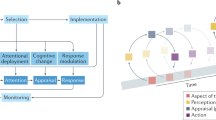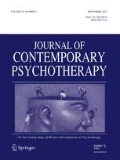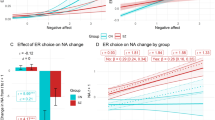Abstract
Emotion regulation corresponds to the individual’s ability to identify and modulate emotional experiences and improvements thereof over the course of psychotherapy are associated with the reduction in psychiatric symptoms across multiple diagnoses. However, the extent to which changes in the capacity for emotion regulation over the course of therapy relate to individual differences in emotion-related self-perceptions, degree of psychiatric distress, and the reasons for seeking psychotherapy remain understudied. This study explored the relations between changes in the capacity for emotion regulation over 8 months of psychotherapy, as defined by all subscales of the Difficulties for Emotion Regulation Scale, trait emotional intelligence and psychological distress. In addition, this study examined whether changes in the capacity for emotion regulation differed between patients reporting at least one regulation treatment goal and those reporting other goals. Data were collected as part of an ongoing program evaluation at an urban community-based mental health clinic. Self-report questionnaires were completed by 74 patients prior to beginning psychotherapy and after completing 8 months of psychotherapy. We found that higher trait emotional intelligence and lower psychological distress were related to improvements in emotion regulation. Moreover, the capacity for emotion regulation, particularly emotional awareness and limited access to emotion regulation strategies, worsened among individuals who reported at least one regulation treatment goal relative to those who reported other goals. As such, an initial phase of psychotherapy that focuses on integrating skills and self-awareness of emotional sensations prior to or in conjunction with embarking on an open-ended exploratory treatment is recommended.
Similar content being viewed by others

References
Amrhein, V., Greenland, S., & McShane, B. (2019). Scientists rise up against statistical significance. Nature, 567, 305–307.
Bateman, A., & Fonagy, P. (2016). Mentalization-based treatment for personality disorders. Oxford: Oxford University Press.
Champely, S. (2006). The pwr package: Basic functions for power analysis. R package version 1.0.
Charmaz, K. (2014). Constructing grounded theory (2nd ed.). Thousand Oaks, CA: Sage Publications.
Cooper, A., & Petrides, K. V. (2010). A psychometric analysis of the trait emotional intelligence questionnaire-short form (TEIQue-SF) using item response theory. Journal of Personality Assessment, 92, 449–457. https://doi.org/10.1080/00223891.2010.497426.
Derogatis, L. R. (1993). Brief symptom inventory (BSI): administration scoring and procedures manual (3rd ed.). Minneapolis, MN: National Computer Systems.
Donohue, M. C., Gamst, A., C., & Edland, S. D. (2016). Package longpower: Sample size calculations for longitudinal data. R package version 1.0-16.
Elliot, A., & Prager, J. (2016). The Routledge handbook of psychoanalysis in the social sciences and humanities. New York: Routledge.
Fernández-García, M. P., Vallejo-Seco, G., Livácic-Rojas, P., & Tuero-Herrero, E. (2018). The (ir)responsibility of (under)estimating missing data. Frontiers in Psychology, 9, 556. https://doi.org/10.3389/fpsyg.2018.00556.
Gratz, K. L., & Roemer, E. (2004). Multidimensional assessment of emotion regulation and dysregulation: Development, factor structure, and initial validation of the difficulties in emotion regulation scale. Journal of Psychopathology and Behavioral Assessment, 26(1), 41–54. https://doi.org/10.1007/s10862-008-9102-4.
Gugliandolo, M. C., Costa, S., Cuzzocrea, F., Lacran, R., & Petrides, K. V. (2015). Trait emotional intelligence and behavioral problems among adolescents: A cross informant design. Personality and Individual Differences, 74, 16–21.
Hallion, L. S., Steinbman, S. A., Tolin, D. F., & Dieenbach, G. J. (2018). Psychometric properties of the Difficulties in Emotion Regulation Scale (DERS) and its short forms in adults with emotional disorders. Frontiers in Psychology, 9, 1–12. https://doi.org/10.3389/fpsyg.2018.00539.
Holtforth, M. G., Wyss, T., Schulte, D., Trachsel, M., & Michalak, J. (2009). Some like it specific: The difference between treatment goals of anxious and depressed patients. The British Psychological Society, 82, 279–290.
Koole, S. L., & Tschacher, W. (2016). Synchrony in psychotherapy: A review and an integrated framework for the therapeutic alliance. Frontiers in Psychology, 7, 1–17. https://doi.org/10.3389/fpsyg.2016.00862.
Lindhiem, O., Bennett, C. B., Orimoto, T. E., & Kolko, D. J. (2016). A meta-analysis of personalized treatment goals in psychotherapy: A preliminary report and call for more studies. Clinical Psychology: Science and Practice, 23(2), 165–176. https://doi.org/10.1111/cpsp.12153.
Linehan, M. (2015). DBT skills training manual (2nd ed.). New York: Guilford Press.
Muth, C., Bales, K. L., Hinde, K., Maninger, N., Mendoza, S. P., & Ferrer, E. (2016). Alternative models for small samples in psychological research: Applying linear mixed effects and generalized estimating equations to repeated measures data. Educational and Psychological Measurement, 75(1), 64–87.
Neacsiu, A. D., Eberle, J. W., Kramer, R., Wiesman, T., & Linehan, M. M. (2014). Dialectical behavior therapy skills for transdiagnostic emotion dysregulation: A pilot randomized controlled trial. Behaviour Research and Therapy, 59, 40–51. https://doi.org/10.1016/j.brat.2014.05.005.
Owen, J., Adelson, J., Budge, S., Wampold, B., Kopta, M., Minami, T., et al. (2015). Trajectories in change in psychotherapy. Journal of Clinical Psychology, 71(9), 817–827. https://doi.org/10.1002/jclp.22191.
Petrides, K. V., & Furnham, A. (2003). Trait emotional intelligence: Behavioural validation in two studies of emotion recognition and reactivity to mood induction. European Journal of Personality, 17, 39–50. https://doi.org/10.1002/per.446.
Petrides, K. V., Mikolajczak, M., Mavroveli, S., Sanchez-Ruiz, M. J., Furnham, A., & Perez-Gonzales, J. C. (2016). Developments in trait emotional intelligence research. Emotion Review, 8, 335–341.
Petrides, K. V., Stough, C., Saklofske, D. H., & Parker, J. D. (2009). Psychometric properties of the trait emotional intelligence questionnaire (TEIQue). Advances in the assessment of emotional intelligence. New York: Springer.
R Core Team. (2013). R: A language and environment for statistical computing. Vienna, Austria: R Foundation for Statistical Computing.
Rabinovich, M. (2016). Psychodynamic emotion regulation in view of Wolpe’s desensitization model. The American Journal of Psychology, 129(1), 65–79.
Rudenstine, S., & Espinosa, A. (2018). Examining the role of trait emotional intelligence on psychiatric symptom clusters in the context of lifetime trauma. Personality and Individual Differences, 128, 69–74. https://doi.org/10.1016/j.paid.2018.02.029.
Sarrionandia, A., Mikolajczak, M., & Gross, J. J. (2015). Integrating emotion regulation andemotional intelligence traditions: A meta-analysis. Frontiers in Psychology, 6, 1–27. https://doi.org/10.3389/fpsyg.2015.00160.
Schöttke, H., Trame, L., & Sembill, A. (2014). Relevance of therapy goals in outpatient cognitive-behavioral and psychodynamic psychotherapy. Psychotherapy Research, 24(6), 711–723. https://doi.org/10.1080/10503307.2014.881578.
Shedler, J. (2010). The efficacy of psychodynamic psychotherapy. American Psychologist, 65(2), 98–109. https://doi.org/10.1037/a0018378.
Silberschatz, G. (2015). Improving the yield of psychotherapy research. Psychotherapy Research, 27(1), 1–13. https://doi.org/10.1080/10503307.2015.1076202.
Sloan, E., Hall, K., Moulding, R., Bryce, S., Mildred, H., & Staifer, P. K. (2017). Emotion regulation as a transdiagnostic treatment construct across anxiety, depression, substance, eating, and borderline personality disorders: A systematic review. Clinical Psychology Review, 57, 141–163. https://doi.org/10.1016/j.cpr.2017.09.002.
StataCorp. (2015). Stata statistical software: Release 15. College Station, TX: StataCorp.
Acknowledgements
We would like to thank all members of the INTERSECT Lab whose contributions are invaluable to the success of the Psychotherapy Evaluation and Clinical Effectiveness (PEACE) Program.
Author information
Authors and Affiliations
Corresponding author
Ethics declarations
Conflict of interest
The authors declare that they have no conflict of interest.
Ethical Approval
All procedures performed in studies involving human participants were in accordance with the ethical standards of the institutional and/or national research committee and with the 1964 Helsinki declaration and its later amendments or comparable ethical standards.
Informed Consent
Informed consent was obtained from all individual participants included in the study.
Additional information
Publisher's Note
Springer Nature remains neutral with regard to jurisdictional claims in published maps and institutional affiliations.
Rights and permissions
About this article
Cite this article
Rudenstine, S., Espinosa, A., Cancelmo, L. et al. Psychological Correlates of Change in Emotion Regulation Over 8 Months of Psychotherapy. J Contemp Psychother 49, 245–254 (2019). https://doi.org/10.1007/s10879-019-09435-6
Published:
Issue Date:
DOI: https://doi.org/10.1007/s10879-019-09435-6



